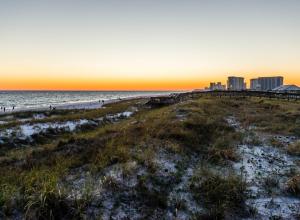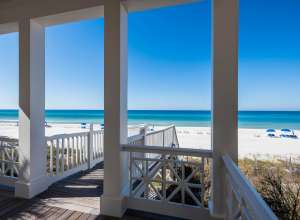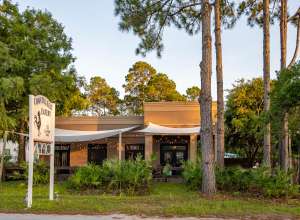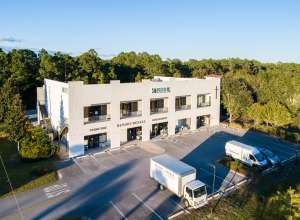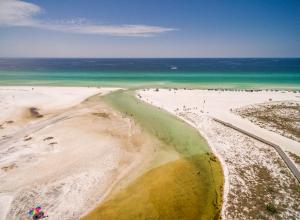Story
Birds of Prey on Display at E.O. Wilson Biophilia Center
February 6, 2012 by Gwen Break

Just like the birds Lisa Miller rehabilitates, she too was given a second chance at the E.O. Wilson Biophilia Center.
Miller is the head of the Center’s Birds of Prey Program. It is a job she has held for seven months and came to hold quite by accident.
“I started my life at age 50,” Miller told audience members at her Jan. 19 presentation at E.O. Wilson.

Miller worked as a volunteer at other organizations, including one of her own, for more than 10 years. She had come to a crossroad in her work when Christina Scally, director at E.O. Wilson Biophilia Center, began calling her with questions.
Scally was writing a grant to get funding to implement the Birds of Prey program at E.O.Wilson. Someone at one of the other rescue organizations gave Scally Miller’s name as someone who could help answer Scally’s questions about birds and their needs.
After several telephone and e-mail conversations between the two women, Miller’s husband encouraged her to apply for the job. After mulling it over, she sent Scally an e-mail asking if they would consider her for the position.
“Within 15 minutes” she received a reply saying she was hired.
According to Miller, it has been a win-win for everyone. The center got a certified, trained rehabilitator, along with the flock of birds Miller has trained and keeps. Miller got a paying job doing the thing she loves to do most.

“When they asked me how much they should pay someone for the job [This was before she was hired], I told them I hoped they had lots of room, because it was going to take several lines to write in the big fat zero I got paid,” she joked with the crowd at her January 2012 presentation.
For Miller, the job means more than just a paycheck. “Everybody who works here is just like me. We’re family,” she explains. “They get me.”
Miller said she knew as soon as she walked in the door that first time, she had come home.
“I did not have a life when I was a rehabber,” she says of her life before coming to the Center. “Birds have to be fed every two hours around the clock. Other animals have to be fed every 15 minutes for 15 hours every day. I had no other life.”
Miller could not have joined E.O. Wilson’s team at a better time. Just this month the center acquired a pair of full-grown bald eagles that had been housed at another facility. While mated for life, the two birds have been separated for the last several weeks while Agena, aged 20, underwent surgery on a wing to correct a previous injury. This gave Miller time to bond with Olaha, the male age 19.

When Agena arrived at the Center the two birds were put into in the same cage but were separated by a wall to give them a period of readjustment. However, when the wall came down, the pair seemed at home with one another.
Miller said there will be a introduction ceremony held on a Saturday to formally introduce the birds to the public later on. Now, visitors can observe the birds but they are not part of Miller’s presentations at the Center.
Miller said she spent a week at the bird sanctuary in Maitland as part of her certification process to handle the eagles. Even though she is permitted as a handler and rehabilitator, the eagles require additional training and experience for certification. In order to get her rehabilitator’s permit, Miller had to have one year of training before even applying. She then had to have 600 hours handling just eagles in order to be permitted to handle them. All this training and the eagles don’t belong to Miller or the E.O. Wilson Center.
“The birds belong to U.S. Fish and Wildlife. They are here by their permission. We are only their caretakers,” said Miller.
Miller’s smallest bird weight four ounces and is an owl. The largest birds she handles are the eagles, which weigh nine pounds each and have a wingspan of more than six feet.
“Working with eagles is at a whole other level,” says Miller. “As corny as it sounds, the first time I had an eagle, he looked into my soul. I had a physical reaction to it. And I cried.”
All the birds Miller has are birds that cannot be released back into the wild.
“The goal of a rehabilitation is always to release the animal back into the wild when possible,” said Miller. She explained in order for a bird to be designated as non-releasable, Fish and Wildlife and at least one veterinarian must sign off on the bird.
The most common injury that will ground a bird is an eye injury, Miller explained. Not only does it affect their ability to see and hunt, it also affects their balance and the way they fly.
Miller is one of nine paid staff members at the Center. Currently there are only six volunteers.
According to its Website, the E.O. Wilson Biophilia Center is part of Nokuse Education Inc. The Center seeks to be an “ecological ‘hot-spot’ available as a gathering place where local and regional scientists can conduct ecological research and participate in symposia that disseminates this research to the public through the Florida Educational Channel.”
The Center was developed by Walton County conservationist and resident M.C. Davis. It is named after and dedicated to world renowned scientist Dr. Edward O. Wilson, a two-time Pulitzer Prize winner. Wilson performed his earliest scientific investigations in northwest Florida and southwest Alabama, and developed the term "biophilia" - the connections that human beings subconsciously seek with the rest of life.
Foremost, the Center is an educational facility. Four days of curriculum that coincide with the Florida's Next Generation Sunshine State Standards are offered to students in 4th, 7th and 10th grades. The E.O. Wilson Biophilia Center educates 6,000 students in a six-county area and averages more than 140 students every school day.
According to Scally, the center’s operating budget is $1.2 million, money raised in multiple ways.
“We have a few grants, a sponsorship from Waste Management and the South Walton Tourist Development Council, individual sponsorships and donations. We are continuously looking for ways to partner with environmentally minded organizations for sponsorship,” said Scally.
There are various levels of sponsorship available for those interested in supporting the Center. Details can be found at www.eowilsoncenter.org/patrons.html.
Volunteers are always appreciated “especially those who come regularly to assist with classes or assist with maintaining our trails.” Volunteer applications may be found at http://www.eowilsoncenter.org/volunteerinfo.html.

Much to Miller’s joy, a new birds of prey building has just broken ground and the Center is developing new curriculum to go with it. Once completed, it means Miller will no longer have to transport her birds from her home to the Center during her presentations.
“We are also working on some new program sponsorships,” said Scally.
“I think what is most meaningful is when we hear of students taking what they have learned here to the next level by implementing changes in their own lives and then getting their families involved. We've seen students write letters to politicians, start their own recycle business, conduct their own environmental experiments, etc. This is what we are really all about and seeing these students make a difference really makes all our work more rewarding.
_____________________________________________________
The E.O. Wilson Biophilia Center is an environmental education facility serving students, teachers and public. Its mission is to educate visitors on the importance of biodiversity, to promote sustainable balanced ecosystems, and to encourage conservation.
Located at 4956 State Hwy 20 E, Freeport, FL 32439, on the· south side of Highway 20 between Freeport and Bruce, approximately 4 miles east of Highway 331
Phone: 850-835-1824
E-mail: crscally@eowilsoncenter.org
On the Web: www.eowilsoncenter.org
On Facebook: http://tinyurl.com/7d4j85s
Admission is $5 per person.
Children ages 6 to 12 are $2.
Children 5 and under are free.
Children under the age of 16 must be accompanied by an adult.
June 1 through Aug. 31
Fridays 9 a.m. - 3 p.m.
Saturdays 8 a.m. - 2 p.m.
Sundays 1 p.m. - 5 p.m.
Sept. 1 through May 31
Saturdays 10 a.m. - 3 p.m.


